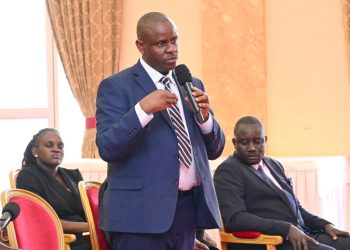Artificial Intelligence students from ISBAT University have made an impressive mark in the recent Revolution Hackathon Uganda competition, securing a significant cash prize of Shs11.1 million.
Among 400 applicants, 16 teams, each comprising four students from various universities and companies, were selected as finalists. Over a three-month period from July to September 2023, these teams underwent intensive coaching and mentorship.
The competition, organized by Total Energies Uganda in collaboration with OutBox Uganda, challenged participants to devise innovative solutions using data related to Kampala city’s road networks, electricity, and traffic infrastructure.
Their goal was to identify optimal locations for Electric Vehicle (EV) charging stations, in anticipation of the growing electric vehicle technology trend in Uganda and Africa.
The top honors went to the “TBKN Team,” which received a cash prize of Shs8,500,000, and ISBAT University emerged as the first runners-up, earning Shs11,100,000.
Additionally, “Data Knight” and “Shalom” teams shared the third place and received Shs3,700,000 each.
The winning team consisted of third-year semester five students – Martin Kenyi, Eric Mathew Luse, Joshua Bwengye, and Jonathan Lokpatchu, all pursuing Bachelors of Science in Artificial Intelligence (AI). They were thrilled to apply their AI knowledge beyond the classroom setting.
Their innovative approach involved utilizing artificial intelligence to identify ideal locations for Total’s EV charging points.
They deployed a genetic automatic algorithm based on the theory of natural selection.
This algorithm generated random points along major roads in Kampala, factoring in constraints like proximity to power distribution lines and fuel stations.
Joshua Bwengye, one of the team members, highlighted the challenging nature of the hackathon, which lasted only three intense days without any time for rest.
Nevertheless, it provided the team with invaluable real-world experience, bridging the gap between classroom learning and practical application to benefit the Ugandan population.
Bwengye explained, “The artificial intelligence algorithm adapts automatically, considering that many fuel stations offer parking, restaurants, and supermarkets. Charging an electric vehicle takes one to five hours to fill up the battery. We envision the system’s scalability to extend beyond Kampala in the future.”
Mr. Jimmy Obira, a lecturer specializing in Internet of Things (IoT) and Embedded Systems at the university, emphasized the significance of modern education in the context of AI and the internet.
It addresses the challenges and opportunities introduced by the fourth industrial revolution, characterized by the convergence of cutting-edge technologies.
Obira noted, “Artificial intelligence will automate industrial processes and revolutionize labor practices. Automation of tasks might replace certain jobs. It’s more efficient to hire a robot than an individual for reminders or to-do lists. Automation enhances productivity in companies and institutions.”
The fourth industrial revolution also presents opportunities in data science, where diverse data sources and sensors require quick interpretation within vast datasets.
The ISBAT team’s AI algorithms aimed to make sense of this data.
Pradeep Kumar, the Academic Registrar of the university, highlighted the empowerment that AI education provides to Ugandan youth, fostering a sense of pan-Africanism.
The university’s vision aligns with an advanced curriculum supporting science, technology, engineering, and mathematics (STEM) education across all programs.
This sets students on a path to excel in the global employment and entrepreneurial landscape, ultimately shaping Uganda and Africa’s future.
The success of ISBAT University in the Total Energies Uganda hackathon underscores the bright future that awaits Uganda as it embraces the power of artificial intelligence and innovation.































































